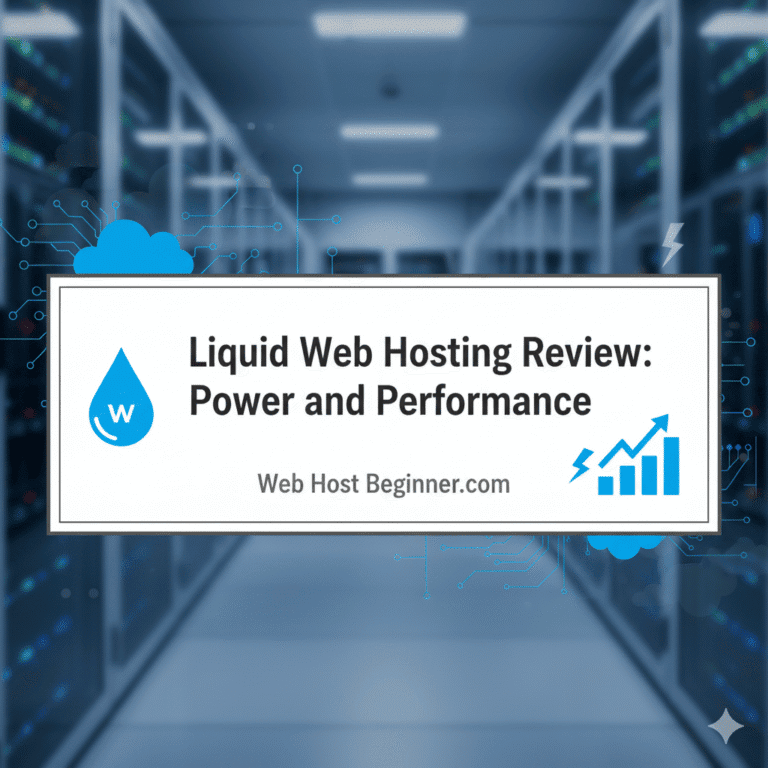Nexcess Hosting Review: The E-commerce Specialist
Speed alone doesn’t win online retail; stability under real traffic does.
If you run stores on WordPress, WooCommerce, or Magento, Nexcess aims squarely at your needs. It combines managed hosting with e-commerce-aware features: automated plugin updates with visual regression testing, 24 hours of free autoscaling each month, PCI-ready infrastructure, a global CDN, staging, and daily backups. That stack reduces launch risk and keeps revenue flowing when promotions hit.
Where Nexcess Fits

Nexcess operates within the Liquid Web family and focuses on managed platforms for online stores and content sites. The brand’s emphasis is clear: WordPress, WooCommerce, and Magento with tooling that addresses the daily realities of commerce at scale. The company also notes a closer brand alignment with Liquid Web to broaden services while keeping the same specialization.
What Makes Nexcess “E-commerce-First”
Visual compare for safer updates
Most outages happen during updates. Nexcess includes a “Visual Comparison” system that snapshots your pages, tests plugin updates in a staged copy, compares before and after, and only applies changes to production if the visuals haven’t drifted beyond a threshold. You can run it automatically or manually from the portal. That cuts regressions without freezing your stack on old versions.
Autoscaling for real traffic, not theoretical benchmarks
Traffic spikes ruin strict caps. Every cloud plan receives 24 free hours of autoscaling per month, with notifications at start, 12 hours, and 24 hours. When spikes hit, Nexcess adds PHP workers from a resource pool per minute-by-minute load checks, then releases them when demand drops. You can leave it on, or disable it in the portal if you need full manual control.
PCI-aware for payment trust
For stores that process cards, PCI matters. Nexcess states PCI DSS Level 1 provider status across solutions and provides compliant data centers alongside guidance to help merchants stay within scope. That simplifies audits and reduces one of the biggest compliance headaches for merchants.
WooCommerce, WordPress, and Magento focus
Nexcess’ managed WooCommerce plans ship with e-commerce-centric defaults like daily backups, core and plugin updates, and autoscaling. Magento plans add extras for high-throughput catalogs, including dedicated IPs and autoscaling PHP workers on a PCI-compliant platform. The WordPress plans carry the same operational toolkit for content sites and funnels that support your store.
Performance stack and global delivery
Managed WordPress plans highlight Object Cache Pro, premium image compression, and a global Cloudflare CDN, paired with proactive monitoring. The combination reduces CPU thrash from dynamic requests and improves TTFB and LCP on product and archive pages. Free migrations and staging are included so you can test before you switch DNS.
Plans at a Glance
Managed WordPress
 Nexcess is a managed hosting provider known for optimized performance, particularly for eCommerce platforms like WooCommerce and Magento.
Nexcess is a managed hosting provider known for optimized performance, particularly for eCommerce platforms like WooCommerce and Magento.
Designed for creators, publishers, and service businesses that need predictable speed. Features include free SSL, daily backups, staging, intelligent plugin updates with visual compare, proactive monitoring, and a Cloudflare CDN. Plans scale by site count, storage, and PHP worker allocation per site.
Managed WooCommerce
Built for carts and checkout. Adds Woo-savvy defaults and the same update safety net. Good fit for stores that stress checkout concurrency during sales or seasonal pushes. The autoscaling model complements Woo’s spiky workloads.
Managed Magento
Aimed at complex catalogs and heavier integration footprints. Differentiators include PCI-compliant hosting, dedicated IPs, and autoscaling PHP workers to keep queue depth under control when cache misses rise.
Cloud sites for portfolios of projects
For agencies that centralize multiple sites into one plan, Nexcess cloud plans package site counts, storage, bandwidth, and plan-level PHP workers with additional autoscaled workers available during spikes. That keeps your busiest stores responsive without over-provisioning the base plan.
How Nexcess Handles Performance in Practice
PHP workers tuned to your tier
On Managed WordPress and WooCommerce, Nexcess allocates a defined number of PHP workers per site and increases them with plan size. More workers raise the ceiling for uncached requests competing at once, which matters on carts, account pages, and search results. Autoscaled workers add burst capacity beyond your plan’s baseline during peaks.

Multi-layer caching and the CDN
Static assets ride the CDN. Object caching reduces database round-trips for dynamic pages. Image compression shrinks payloads without destroying clarity on product pages. Together, these reduce server time and network time, the two places where most stores leak speed. Nexcess
Safer updates, fewer late-night rollbacks
Visual compare reduces risk from plugin churn. If the system detects a visual mismatch after an update in staging, it rolls back and alerts you to review the change. That lets teams keep security patches current without slow “freeze windows” before promotions.
Reliability and Support
Nexcess emphasizes 24/7/365 support with proactive server monitoring. The platform’s autoscaling and update workflows help keep you online while support remains there for edge cases and tricky plugin conflicts. If you inherit legacy sites, free migrations smooth the move and preserve uptime.
Security and Compliance
Beyond PCI readiness, security posture includes SSL by default, managed updates, rollback capability, and Solid Security Pro availability for deeper version management and protections. These layers reduce the window where known vulnerabilities stay exploitable.
Developer and Agency Workflow
Staging and safe deploys
Create staging environments, apply updates, test payment flows, then sync to production. This habit sits at the core of stable releases for commerce.
Blueprint-friendly onboarding
Within wp-admin, the Nexcess panel lets you install recommended performance and feature plugins quickly, which shortens repeatable setup tasks on new client builds. That complements any blueprint or starter-site process you already use.
StoreBuilder for fast MVPs
If you need to validate a small shop fast, StoreBuilder sits on WordPress and offers drag-and-drop design with reporting and common integrations. It’s a streamlined way to test offers before rolling into a full WooCommerce build.
Strengths
- E-commerce-aware defaults. Autoscaling, visual compare, and staging align with how stores actually fail under load.
- PCI posture and Magento depth. Level 1 status and Magento expertise reduce friction for larger stores.
- Performance stack included. Object Cache Pro, global CDN, and image optimization are part of managed plans.
- Predictable operations. Free migrations, daily backups, and proactive monitoring support steady cadence.
Limitations
- Interface familiarity. If your team expects cPanel everywhere, Nexcess’ portal and SiteWorx layout will take a short orientation. Not a blocker, but plan a quick walkthrough.
- Not the cheapest path. You pay for autoscaling, visual compare, and managed care. For side projects with near-zero commerce needs, bare hosting may cost less.
- Woo and Magento sweet spot. You can host content sites here, but you realize the most value when carts, search, and promotions run often.
Best-Fit Use Cases
- Established Woo stores planning campaigns that create burst traffic. Autoscaling and worker tuning reduce checkout friction during spikes.
- Magento catalogs with deeper integration and compliance demands. Dedicated IPs and PCI make audits simpler.
- Agencies running many stores that need consistent update hygiene, quick staging, and reliable rollbacks across a portfolio.
- Creators and course sellers that use funnels and gated content. WordPress plans bring the same guardrails to non-cart sites.
Migration and Launch Playbook
- Audit your current stack. List plugins, custom code, and payment gateways. Note any unusual server extensions.
- Request a migration. Use the included migration service; confirm timelines and a maintenance window even if you expect zero downtime.
- Stage and validate. Rehearse updates in staging, check product pages, cart, checkout, and tax/shipping calculators.
- Switch DNS with monitoring. Watch error logs, worker usage, and CDN cache hit ratios for the first 24–48 hours.
- Schedule promotions after a quiet day. Let autoscaling prove itself on steady traffic before you run ads or email pushes.
How Nexcess Compares
- Kinsta / WP Engine: All three emphasize managed WordPress performance. Nexcess leans harder into e-commerce operations with autoscaling time included and visual compare built in, while competitors emphasize other platform strengths.
- Cloudways: Strong flexibility across clouds and stacks; you manage more knobs. Nexcess removes knobs in favor of opinionated defaults for stores.
- Budget shared hosts: Lower sticker price, fewer safeguards. If promotions matter, the cost of a failed sale often dwarfs the monthly savings.
Decision Checklist
- Do you run WooCommerce or Magento with real checkout volume?
- Do you plan timed promotions or seasonal surges?
- Do you want automated plugin updates with visual safety checks?
- Do you need PCI-aware hosting or dedicated IPs?
- Do your developers rely on staging, rollbacks, and quick migrations?
If you answer “yes” to three or more, Nexcess belongs on your shortlist.
Final Takeaway
Nexcess earns the “e-commerce specialist” label by solving the two moments that cost stores the most money: updates and spikes. Visual compare keeps changes safe, and autoscaling keeps carts responsive when traffic surges. Add PCI posture, a tuned performance stack, and staging with backups, and you get a host built for revenue days, not just quiet Tuesdays. For teams that sell online and can’t afford rollback roulette, it’s a smart, defensible choice.
Frequently Asked Questions
Does Nexcess really include free autoscaling time?
Yes. Cloud plans include 24 hours of free autoscaling per site per month, with alerts at start, halfway, and at 24 hours. You can disable it in the portal if you prefer.
What is “visual compare” in plain terms?
It’s automated visual regression testing for plugin updates. Nexcess clones your site, applies the update in staging, compares snapshots, and only proceeds if nothing meaningful changes. Otherwise it stops and lets you review.
Is the platform PCI-compliant for card payments?
Nexcess states PCI DSS Level 1 provider status across solutions and runs compliant data centers. You still must configure your store correctly, but the infrastructure side aligns with PCI requirements.
How does Nexcess handle performance for busy Woo stores?
Managed plans allocate PHP workers per site and scale them by tier. Autoscaling adds more workers during bursts so carts and account pages keep responding under load.
Can I move an existing store without downtime?
Free migrations are included. Best practice is to stage, validate, then switch DNS during a low-traffic window with monitoring in place.
Is there a CDN and object caching included?
Managed WordPress plans include a global Cloudflare CDN and Object Cache Pro, plus image optimization. These reduce database calls and speed page delivery.





